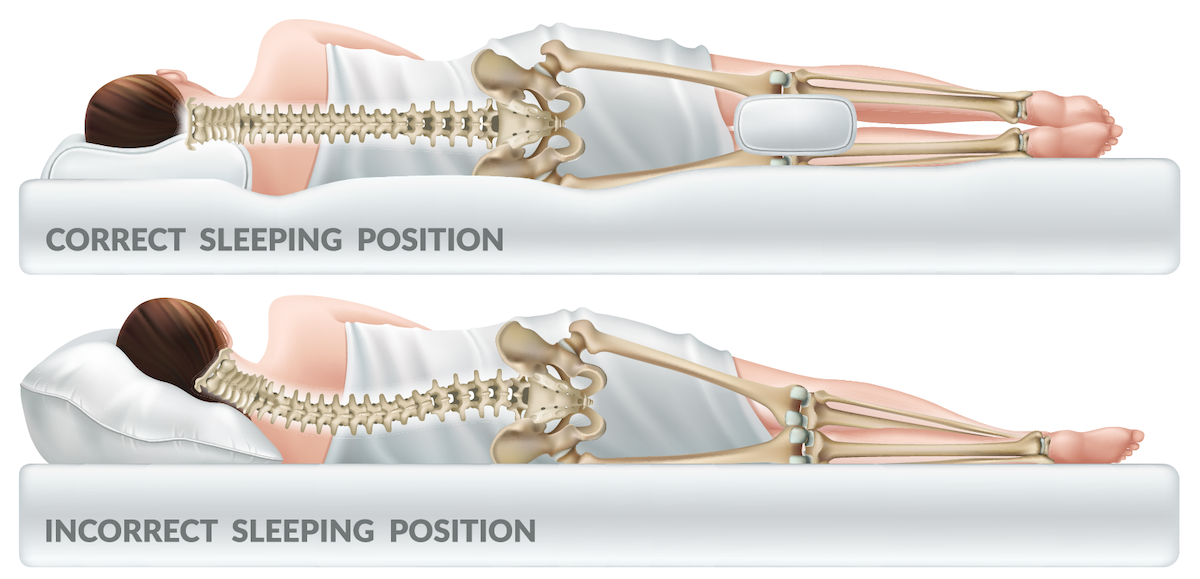If you suffer from back pain, you know that it can affect many parts of your life, including how well you sleep. Back pain that interferes with sleep can be caused by many conditions, including:
- Spinal stenosis
- Sprains and strains
- Disc degeneration
- Herniated or ruptured discs
- Spondylolisthesis
- Sciatica
- Traumatic injury
According to the Centers for Disease Control and Prevention (CDC), one in three adults don’t get enough sleep at night, regardless of whether they have back pain. The National Sleep Foundation has a National Sleep Awareness Week each year to bring attention to the importance of sleep for overall health. If one of the above spinal conditions is negatively affecting how much sleep you get, then you need to make sure your alignment is good while you’re lying down. Try out some of these sleep positions for back pain to find relief.
Sleeping On Your Back
Sleeping on your back is generally considered to be the best position to sleep in if you are experiencing pain. Lying on your back evenly distributes your weight and reduces stress on pressure points. To make this position even more comfortable for your back, you can do try the following:
- Sleep on your back with a pillow under your knees. This position will keep the curve in your lower spine even while lying on your back.
- Lie flat on your back
- Put a pillow underneath your knees to keep them in a neutral position
- If needed, you can use a second small pillow under your lower back for additional support
- Sleep in a reclined position. Some people with back problems find it easiest to fall asleep in a reclining chair. However, it’s not always ideal to sleep in a chair. If you have a condition like spondylolisthesis and you find reclining to be the most comfortable sleep position, then consider adjusting your bed to recreate the position.
- There are special pillows and wedges designed to help you recline.
- Depending on how much relief you get, you might consider investing in an adjustable bed.
Sleeping On Your Side
- Sleep on your side with a pillow between your knees. The pillow will keep your hips, pelvis, and spine in alignment.
- Lie on your back and roll gently to one side
- Place a pillow between your knees
- If there is a space between your waist and the mattress while you’re in this position, you can use a small pillow under the waist for more support.
- Make sure you alternate which side you sleep on
- Sleep in the fetal position, but not too tightly. People suffering from herniated discs may benefit from this sleep position for back pain relief.
- Lie on your back and roll gently to one side.
- Tuck your knees toward your chest
- Gently curl your torso towards your knees
- Switch sides every now and then
Sleeping On Your Stomach
The National Sleep Foundation advises against sleeping on your stomach if you have back pain. It can add stress to both your neck and lower back. However, if you can’t break the habit of sleeping on your stomach you can make adjustments to make it more back-friendly.
- Place a pillow under your pelvis and lower abdomen to relieve pressure on the lower back.
- Use a very thin pillow or no pillow at all under your head. This can reduce stress on the neck while sleeping
Additional Tips
Along with these sleep positions for back pain, you may find relief by making sure you have the right mattress and pillow. There is no hard and fast rule for the best type of mattress or pillow because comfort should be the key. Some people like a firm mattress and some people prefer a soft one. This is also true of pillows. To test out options, some hotels have beds with different firmness levels. Some mattress stores also allow you to test your mattress for a night or two. There are also resources online that have lists of specific brands and models that have the best reviews for each type of sleep position.
Talk To a Spinal Specialist
Sleeping finding the best sleep positions for back pain relief can be helpful if you have a spinal condition. However, if you are experiencing chronic pain that is interfering with your day-to-day life, you may need more than a good night’s sleep to help. Dr. Nael Shanti of Cary Orthopaedics Spine Center specializes in treating spinal conditions with expertise in minimally invasive surgery. He has years of experience helping patients with conditions like spinal stenosis, disc degeneration, degenerative spondylolisthesis, and disc herniation. To make an appointment with Dr. Shanti, call (919) 297-0000 to make an appointment with Dr. Shanti.

